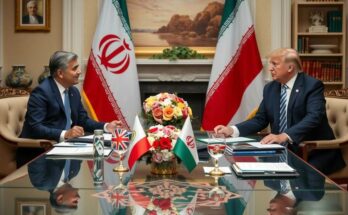Prime Minister Benjamin Netanyahu traveled to New York for a UN address amid escalating tensions with Hezbollah. As the IDF continues military operations along the border, discussions of a ceasefire are gaining traction, with U.S. support for a proposed truce. Biden emphasized the importance of preventing further conflict escalation, while Israeli military actions continue against Hezbollah targets. The call for ceasefires indicates an urgent need for diplomatic solutions in light of the humanitarian impact of ongoing hostilities.
Prime Minister Benjamin Netanyahu embarked on a significant journey to New York on Thursday morning to address the United Nations General Assembly amidst escalating tensions along the Israel-Lebanon border. As discussions of a potential ceasefire between Israel and Hezbollah arise, the situation remains precarious. The Israel Defense Forces (IDF) report engagement with suspected hostile movements near the Lebanese border, coupled with preparations for a possible ground offensive. The recent escalation has seen increased military operations, with the IDF striking approximately 280 Hezbollah targets in Lebanon. Concurrently, a concerning drone explosion in Eilat adds to the regional security challenges. Reports indicate that a rocket fired from Lebanon has wounded two individuals in northern Israel, heightening fears of a broader conflict. The situation is compounded by worsening conditions in Gaza, where international calls for a ceasefire are gaining momentum. President Joe Biden has voiced his support for a proposed three-week truce intended to prevent further escalation. He emphasized the importance of maintaining regional stability, stating that the war must not widen. In a statement delivered alongside French President Emmanuel Macron, Biden mentioned, “it is time for a settlement on the Israel-Lebanon border that ensures safety and security to enable civilians to return to their homes.” As diplomatic efforts intensify, the Lebanese Prime Minister echoed calls for an immediate ceasefire across all fronts. The evolving crisis raises urgent questions about the humanitarian impact of ongoing military operations, with reports indicating significant displacement of civilians in Lebanon. Moreover, the U.S. Secretary of State has underscored the need for diplomatic engagement to mitigate this delicate situation. As Netanyahu prepares his remarks at the UN, he must address both the international community’s concerns and the pressing security challenges Israel faces on its northern borders. The coming hours and days will be crucial in determining the trajectory of the conflict and the feasibility of achieving lasting peace.
The current geopolitical landscape involves heightened tensions between Israel and Hezbollah, exacerbated by ongoing military confrontations. Following the outbreak of hostilities that began on October 7th, numerous efforts have been made by the international community, particularly the United States and European allies, to broker a ceasefire. This context includes a focus on humanitarian needs affected by the conflict, as well as calls for diplomatic engagement to resolve underlying issues fueling the violence. As Prime Minister Netanyahu prepares for his speech at the UN, the weight of these conflicts and the urgency of diplomatic resolution will be pivotal themes.
In summary, Prime Minister Netanyahu’s address at the UN comes at a critical juncture as armed confrontations with Hezbollah persist. The calls for a ceasefire from the U.S. and its allies signify a collective desire to stabilize the situation and prioritize humanitarian concerns. The immediate future remains uncertain, with ongoing military confrontations posing significant risks not only to Israeli and Lebanese civilians but also to regional peace and security. The outcomes of these discussions and military actions will have lasting implications for both nations and the broader Middle Eastern region.
Original Source: www.haaretz.com




